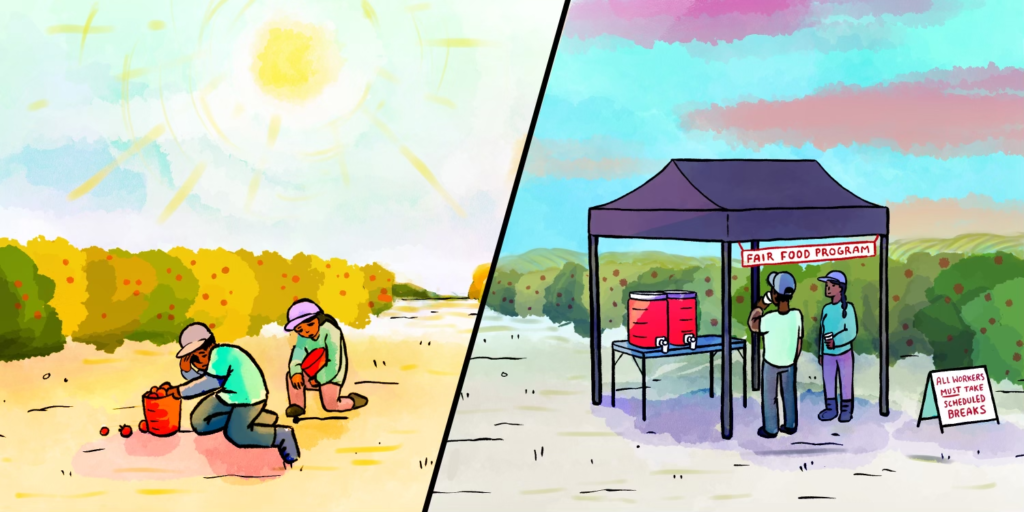
FOR IMMEDIATE RELEASE
Fair Food Program’s heat illness standards are saving farmworkers’ lives amidst record-shattering summer temperatures
Professor Susan Marquis, Princeton University, op/ed in Miami Herald on FFP heat illness standards: “The Fair Food Program’s heat illness prevention standards already are proven. Crews are staying hydrated and safe. As one farmworker reported, “We can do more than improve day-to-day health and safety conditions. We can prevent a father or mother, a daughter or son, from losing their lives.’”
IMMOKALEE, FL – As scorching summer temperatures endanger the lives of farmworkers across the nation, and at least two farmworkers in South Florida alone have succumbed to the record heat this year, advocates are urgently sounding the alarm for rigorous and enforceable heat stress protections. While these advocacy efforts are desperately needed to protect hundreds of thousands of the country’s hardest and most vulnerable workers, there is a program that has been in operation since 2011 in farm fields from Florida to Colorado that deploys the very same protections – water, shade, and mandatory rest breaks – that advocates are calling for today around the country, and more, including on-the-clock education on their rights for farmworkers and training in life-saving interventions to prevent heat stress illness and death for supervisors. Indeed, the Fair Food Program’s Heat Illness Standards not only provide the essential elements for effective heat stress protection, they also, as part of a broader, Presidential-medal winning program to safeguard farmworkers’ basic human rights, have the power to actually enforce those standards in the fields.
To protect workers under its standards, the FFP is backed by the market power of 14 major retailers including Walmart, McDonald’s, Whole Foods, and Trader Joes, all pledged to suspend purchases from growers who are suspended from the program for violating its standards, giving the program real teeth. The FFP is monitored by a team of independent, trained human rights investigators with the Fair Food Standards Council. As a recent op-ed by the Miami Herald lays out, “the program is credited with eliminating unsafe working conditions, wage theft, beatings, rape and forced labor for tens of thousands of farmworkers each year on participating U.S. farms.”
Thousands of farmworkers are covered by the FFP, which is operative today in 12 crops in 10 states, and 3 countries. To extend these life-saving heat stress protections to workers currently toiling in fields beyond their reach, farmworkers with the Coalition of Immokalee Workers are pushing for the rapid expansion of the FFP, calling on major food brands – companies including Kroger, Wendy’s and Florida’s own Publix – to join the program and help bring these best-in-class protections to tens of thousands of more farmworkers across the county.
*******
Quotes from Farmworkers under the FFP heat illness protections: The Fair Food Standards Council maintains a data base of their audit and complaint investigation results, including quotes from workers interviewed in the auditing process. One farmworker told Fair Food Program auditors: “I worked here ten years ago, and it was a very abusive environment. We were rushed to work harder all the time, and we were yelled at and disrespected. We felt beaten down, nervous around our supervisors, and worked almost like slaves. We had no one to complain to about this abuse, so nothing ever changed… I heard from friends that continued to work at [the farm] that things had changed, and I came back to work… The environment here is so much better; we have everything we need, from gloves to bathrooms to water and shade, and if we have a complaint… Workers here are now treated with respect, like human beings.”
Another farmworker told auditors: “The fields have changed – now, we have better wages and better treatment for everyone. Before, there was nothing like that. Before, I would be working under the sun, working hard, and I would want to stop for water. The boss would stop me, and I would say, I need water. He would say, there’s the ditch over there, it’s got some water. There were no water bottles. We were exhausted, we needed water. There were no toilets. Before, if you spoke out, you would be fired. Tomorrow, don’t come, there’s no work for you. But now that we are united, we have strength. We are taking steps forward, and we cannot go back. We have to go forward. We are building a road forward, and we will never go back.”
*******
Interview Opportunities: Farmworkers with the Coalition of Immokalee Workers, the worker-led organization that forged the Fair Food Program, are available to speak on the record regarding their experiences working in the field, building the Presidential medal-winning Fair Food Program, and expanding its scope to include Heat Illness Standards. FFP Participating Growers and Buyers may also be available.
Media Contact
Ty Joplin
832-549-7337
#####
About the Fair Food Program (FFP): Participating retailers in the Coalition of Immokalee Workers’ Fair Food Program agree to purchase from suppliers who comply with a worker-driven code of conduct, which includes a zero-tolerance policy for forced labor and sexual assault. Retailers also pay a “penny-per-pound” premium, which is passed down through the supply chain and paid out directly to workers by their employers. Since the program’s inception in 2011, buyers have paid over $42 million in premiums. Harvard Business Review called the FFP “one of the most important social-impact stories of the past century,” while the UN Special Rapporteur on Human Trafficking called it “an international benchmark in the fight against modern-day slavery.” The FFP received a Presidential Medal in 2015, and a MacArthur “Genius” Award in 2017, among its many national and international recognitions.
